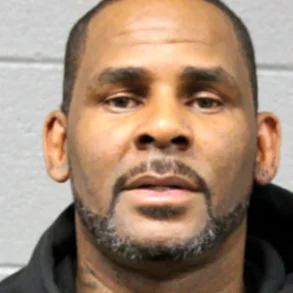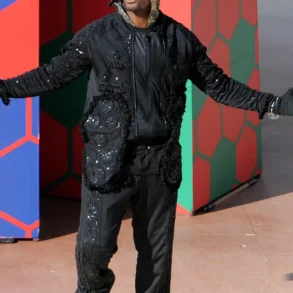Alim Braxton, 50, has been behind bars in North Carolina since he was 19 years old. The Raleigh native went to prison in 1993 for taking two lives during a robbery spree. He went to death row in 1997, after killing a fellow incarcerated person.
But way before Braxton was sentenced to death, his life was dedicated to hip-hop culture. He recalls breakdancing in 1983, writing his first rap in 1986, and competing in his first rap battle two years later. His first and only concert? The Fat Boys. And his fashion was ’80s fresh: suede Pumas with fat laces, a Kangol hat and a gold cap on one tooth.
In the three decades since Braxton went to prison, he has converted to Islam and learned to use his music as a form of therapy. On May 30, under the moniker RRome Alone, he dropped “Mercy on My Soul,” the first-ever rap album recorded on the phone from death row. The project began after Braxton wrote a letter to Mark Katz, a University of North Carolina at Chapel Hill music professor. Katz enlisted UNC-Wilmington sound design professor Michael Betts II to record vocals. Producer Nick Neutronz made the beats.
Braxton also recently released “Rap and Redemption on Death Row,” a memoir he co-wrote with Katz. In the following book excerpt, which was copy edited to comply with The Marshall Project’s style, the MC describes the artistic and technical challenges of rapping during dayroom phone calls that cost 11 cents a minute.
There’s nothing easy about rapping over the phone, especially on a prison phone on death row. I sometimes feel awkward or self-conscious — as Erykah Badu once said, “I’m an artist, and I’m sensitive about my shit.” If I’m rhyming to an audience — even if it’s just a few people — I can feed off the crowd’s energy. When you look in someone’s eyes and see that they are feeling you, nodding their head, or making expressions of awe, then that’s motivation to kill it. But when I’m on the phone, there’s no crowd.
Usually, my back is to the dayroom. People are at a distance. I’m not sure if they are listening. Sometimes I hear them talking casually. Sometimes they are playing cards, or working out, and sometimes there’s silence. It’s hard under those circumstances to feel like you’re giving your best performance. Sometimes I get in my head wondering if anybody is even paying attention, or maybe they think I’m wack. If I’m not going to have a real audience, I would prefer to be alone in a booth to just let go and give it everything I’ve got.
Rapping on the phone in the dayroom, I sometimes hold back. I don’t spit it like it was supposed to be spit. I don’t put enough emotion in it. Still, sometimes people will come up to me later and say they liked a song I was doing earlier, and they might repeat a line. That always makes me feel better and motivates me for the next session. One guy jokingly calls me Suge Knight, the infamous CEO of Death Row Records. He’ll say, “I heard you over there this morning, Suge Knight. You representin’ death row!”
The first song I recorded over the phone and posted on SoundCloud was “Round My Way.” I wrote that song maybe a week or two before recording it. I didn’t have the courage to record my best stuff first because if nobody liked it, I would’ve been crushed.
So I put out “Round My Way,” and people liked it! My brother Chris — Doc, as I call him — is my No. 1 fan on the outside. According to SoundCloud, he’s listened to “Round My Way” over 700 times!
“Round My Way” was just an a cappella, and the feedback I kept receiving was that I needed to put it to a beat. I reached out to people to see if they could help, but I kept getting the same response: My timing was off.
I didn’t understand. If my timing was off, why couldn’t they adjust the music to my tempo? I concluded that they must be amateurs. I figured a real producer could make it work.
I kept recording and released more a cappellas. After a few months, I linked up with a Raleigh producer named Dj Dezerk. We talked a couple of times on the phone, and he, too, explained that my timing was a problem. He said that my tempo was constantly changing, and I needed to record my a cappellas to a timed beat. For the first time, it started to sink in that these producers weren’t incompetent. My timing really was a problem.
I tried to figure out a way to overcome this obstacle but kept drawing blanks. I thought I had found the solution when Dj Dezerk played a beat from his computer over the phone so I could rap over it. But we soon discovered two problems. The first was that there is a slight delay on the phone, perhaps due to the calls being recorded. This would throw my rhythm off, making it very difficult to rap to. But the real problem was the second one. As soon as I started rapping, all I could hear was my own voice being played back to me a second later like a huge echo. It completely drowned out the beat.
We went back to the drawing board. He suggested that I rap to a metronome. He played one over the phone and explained what it was. But it sounded weird — just a bunch of beeps — and I couldn’t lock in with it.
I felt like we were making no progress. I was wasting time and money since each call cost me 11 cents per minute, and I was spending hours on the phone. But one day I was listening to the radio, and I just started rapping “Round My Way” on top of another song. I realized that I could block out whatever was being sung and just rap to that beat. Perhaps that would solve the timing issue. At least my rhyme would be to a fixed tempo. I called Dj Dezerk and told him my idea. He said it was worth a try. I turned on my radio and waited for the next song to begin. I had no way of knowing what song was gonna be played and at what tempo.
And I only had the three minutes or so that the average song plays on the radio. I couldn’t mess up. I can’t even remember what song came on. But I went in. I blocked out everything and made it my song. Dj Dezerk said we had a tape. He said my vocals came out good, and he was gonna get to work on it right away. I was excited. I just knew that within a few weeks, I was gonna be hearing myself on the radio! All I needed was a good beat.
A couple of weeks went by, and we had something. Dj Dezerk sent a skeleton version of a beat and my rhymes to my brother via email. Doc loved it. He played it every day. My mom said he literally kept it on repeat. Dezerk told me that he had let a few people hear it and they were already saying it had all the potential to be a hood anthem for Raleigh. I was stoked and ready to record something else. I told all my friends that I was about to release a song.
And finally, that day came. It was May 29, 2019. I had my niece email the song to several local DJs. My mom asked me if I had heard it yet. I told her no. She said, “Well, your brother liked the original version better.”
“What do you mean?” I asked. She said he liked the skeleton beat and rhyme better than the final cut, and she agreed. I wanted to know what was different, and she said I just needed to hear it. It took me about a month before I managed to find someone to play it for me. I was immediately disappointed. No shade on Dj Dezerk, but it didn’t sound like the song I envisioned. It didn’t have the beat that I had in my mind, and the sound quality of the vocals was poor. I felt resigned. I thought I would never be able to accomplish my dreams. Not because of my lack of talent, but because of my lack of access to quality technology.
From Rap and Redemption on Death Row: Seeking Justice and Finding Purpose Behind Bars. Copyright © 2024 Alim Braxton and Mark Katz. Used by permission of the University of North Carolina Press.
Alim Braxton (a.k.a. RRome Alone) is a writer, rapper and activist living on death row in Raleigh, North Carolina. His debut album “Mercy on My Soul” is available on Spotify and YouTube. Official singles and freestyles can be found on Apple Music and SoundCloud. Follow Braxton on Instagram at @rromealone.
Mark Katz is the John P. Barker Distinguished Professor of Music at the University of North Carolina at Chapel Hill and the author of several books, including “Build: The Power of Hip Hop Diplomacy in a Divided World.”
This post was originally published on this site be sure to check out more of their content.








